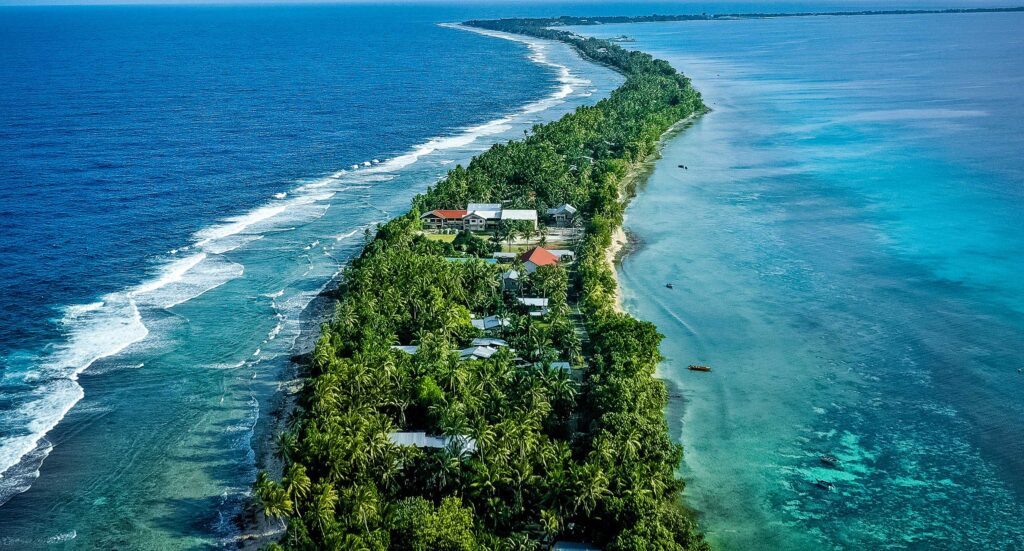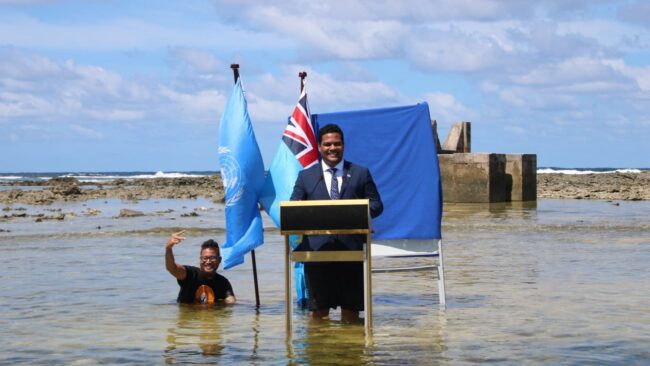
First Country in the world That will Disappear soon (Tuvalo)
*Tuvalu’s Sinking Future: A Nation on the Frontlines of Climate Change*
*A Nation Under Threat*
Tuvalu, a Pacific island nation far off in the blue, has become an emblem of the brutal nature of climate change. Comprising nine low-lying coral atolls and islands, Tuvalu is inhabited by little more than 11,000 individuals and is one of the planet’s smallest and most susceptible nations. Its own existence is being destroyed by the encroaching sea—a merciless product of global warming that stands to eliminate it from the face of the earth altogether.
The world was reminded of Tuvalu’s desperate plight in 2021 when Foreign Minister Simon Kofe’s video went viral. In a powerful performance, Kofe spoke to the United Nations climate conference COP26 standing knee-deep in sea water. In a suit and behind a podium in the ocean, he made one point very clear: climate change is not something that will happen in the future—it is occurring right now, and Tuvalu is living proof.
*Tuvalu: A Brief History*
A former part of the British colony the Gilbert and Ellice Islands, Tuvalu gained independence in 1978. Its name, derived from Tuvaluan for “eight standing together,” reflects the eight inhabited islands of the country. Small as it is—only 26 square kilometers in area—Tuvalu has a unique cultural heritage and identity based on Polynesian customs.
For centuries, the people of Tuvalu lived in harmony with their environment, relying on fishing, farming, and a strong sense of community. But as sea levels rise, that way of life is being washed away.

*Why Tuvalu Is Disappearing*
Tuvalu’s exposure is tied directly to its geography. Being a low-lying island country with the vast majority of land only a few meters above sea level, even minimal rises in sea levels have catastrophic consequences. Global sea levels have risen by about 0.2 meters (0.7 feet) in the last century, based on the Intergovernmental Panel on Climate Change (IPCC), a worrisome development that is accelerating.
The reasons are evident: the thawing of polar ice caps, the rise of seawater because of increasing temperatures, and more violent weather like cyclones and storm surges. Tuvalu is also suffering from coastal erosion, intrusion of saltwater in freshwater sources, and coral bleaching—only adding to its susceptibility.
*The Human and Environmental Cost*
The implications for Tuvaluans are deep-seated. Land that they occupy is being reduced. Farming is in trouble. Safe drinking water is becoming harder to find. The nation’s subsistence foods are being interrupted, and the threat of vector-borne illnesses is increasing.
More than just a physical threat, the sea level rise endangers Tuvalu’s culture, language, and identity. If the islands become uninhabitable, the world will not just lose a territory—it will lose a unique heritage that has existed for centuries.
*A Call for Global Action*
Minister Simon Kofe’s 2021 speech urged the world to see Tuvalu’s situation as greater than regional concern—it is global. “We stand here today not as a plea for sympathy,” he stated, “but as a call to action.
His words resonated with a wider truth: what was occurring in Tuvalu yesterday could occur elsewhere tomorrow. Global warming, violent weather, and forced migration are worldwide issues that know no borders. The destiny of Tuvalu is the destiny of all countries.
*International Efforts and the Falepili Union*
In response to the crisis, there have been some international responses, but few would argue these are adequate. The 2015 Paris Agreement promised to cap warming at well below 2°C of warming above pre-industrial levels, but implementation has been haphazard. With 2023 officially entering history books as the hottest year on planet Earth, time is getting shorter.
A significant development is the *Australia-Tuvalu Climate and Migration Agreement** (also **Falepili Union*), signed on November 9, 2023. The historic agreement permits 280 Tuvaluans annually to settle permanently in Australia. The agreement addresses three main areas:
*Climate adaptation*, such as AU$11 million (US$7.2 million) in assistance for coastal protection;
*Mobility*, issuing special visas for residence, education, and employment in Australia;
*Security*, with promises to assist in the event of natural catastrophes.
Though this treaty provides some respite, it also poses tough questions regarding climate migration, national identity, and the legal status of vanishing nations.
*A Changing World Map*
The possible loss of Tuvalu is a sober glimpse of things to come for the world. Other island states such as the *Marshall Islands*, under the same threat, may not be far behind. If temperatures keep going up and seas keep rising, we will witness more uprooted populations, more climate refugees, and eventually a new world map.
At stake is not only land, but people, cultures, histories, and identities. Climate change is no longer a matter of theoretical argument—it is a reality for many, and Tuvalu is on the front line.
* Tuvalu’s Fight is Humanity’s Fight*
Tuvalu’s plight is not a national crisis—it’s an international wake-up call. It’s a reminder that the climate crisis is already remaking lives and landscapes. Losing this Pacific island paradise would be a loss not just of a nation but of humanity’s ability to act in time.
It’s no longer a matter of sympathizing. What the world needs today is urgent, collective, and affirmative action—to cut emissions, assist vulnerable countries, and preserve the destiny of our common planet. Tuvalu’s story might become many people’s. The hour to act is now.
*Featured Image:* Ministry of Justice, Communication and Foreign Affairs, Government of Tuvalu (screenshot)
